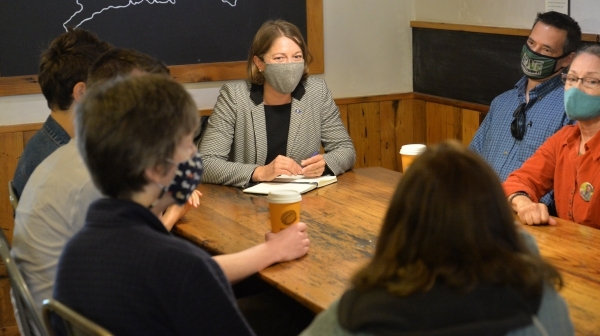BRATTLEBORO — All summer, Lt. Gov. Molly Gray has been doing a listening tour through Vermont, but it took until the first full week of autumn for Gray to arrive to the southern part of the state.
Gray has now been to every county in Vermont on what she calls the Recover Stronger tour. She said she and House Speaker Jill Krowinski, D-Burlington, and Senate President Pro Tem Becca Balint, D-Brattleboro, have been gathering feedback from people around state, and the three plan to present what they learned to Gov. Phil Scott in the coming weeks.
They all had one major goal in mind, Gray said.
“Let's get out of the State House and really get to understand some of the needs of the communities,” she said. “The State House was closed during the last session and everything was via Zoom. It was really, really hard to get a sense of what's happening.”
A day of listening in Brattleboro
Gray spent Sept. 28 in Brattleboro. In between a visit with Norma Hardy, Brattleboro's new police chief, and a meeting with staff from the Brattleboro Development Credit Corp. and those behind the effort to help resettle refugees from around the world in the area, Gray had a brief talk with a group of citizens and town officials at The Works Café on Main Street.
At the head of a long table there, Gray took notes as people spoke about their various issues and concerns.
Longstanding frustrations such as better access to broadband internet shared the stage with issues such as upgrading public infrastructure and finding solutions for what has recently been framed as human infrastructure, such as access to expanded child care and affordable housing for working families.
State Rep. Mollie Burke, P/D-Brattleboro, who serves on the House Transportation Committee, asked how the state can meet the goals it set for itself to reduce carbon emissions to ease the impact of climate change.
Gray said doing so “comes with a price tag,” so it will be critical to make the transition to a carbon-free economy in a way “that's equitable so all Vermonters can participate.”
She said she hopes that the federal assistance funds can be used to improve public transportation.
Selectboard member Tim Wessel pressed Gray on the need for better communication and coordination between state and local government.
He said that Brattleboro's share of the ARPA funding coming to Vermont amounts to $3 million and the town “needs to understand the opportunities coming from the state” on how to use that money.
Gray agreed that better coordination is needed, especially since towns may be able to get another slice of the state's ARPA money so they can tackle major infrastructure projects.
She said that those making policy at the federal level do not understand that Vermont is a state that has many separate municipal governments, rather than 14 county governments, and that the money has to be distributed accordingly.
Betty Frye of Guilford said the first round of funding for Covid relief last year was welcome, but some who could have benefited from the help fell through cracks because of the confusion surrounding eligibility for the various programs.
Selectboard member Ian Goodnow said the current Covid crisis, and the robust response from the Biden administration, represent “a moment when we can change the narrative for Vermont” and get beyond having the same conversations over and over again.
“It's going to take leadership, and we need it,” said Goodnow.
Gray said that it will all come down to government being accessible and accountable to the people it serves and fostering a spirit of trust and cooperation.
“We need experience, we need wisdom, and we need a lot of young people getting fired up about serving in government,” said Gray. “We also need to recognize that if our government is to work, we have to build trust.”
'Not out of the pandemic'
Addressing the pandemic, Gray said she has been mostly satisfied with the Scott administration's response, but she believes that Vermonters “need very, very clear guidance” on masking to reduce the spread of the virus.
Scott has recommended wearing masks while indoors in public places, but Gray believes it should be a requirement.
“There are still a lot of people who don't know we need to be wearing them,” Gray said, adding that she will continue to push the administration to provide stronger guidance.
“We're not out of the pandemic,” she said. “The numbers keep going up.” She urged Vermonters who haven't been vaccinated to do so, and to be sure to get booster shots when they are available.
Turning funding into strategic investments
Gray said the listening tour “has been informative. We've been meeting with hospitals, with designated agencies, with nonprofits, with business and community leaders, and [we've been] just listening to try to figure out, with all the federal money coming to Vermont, how we should spend it.”
Vermont will be getting $2.7 billion in federal assistance through the American Rescue Plan Act (ARPA) to deal the various aspects of the COVID-19 pandemic, Gray said, with the possibility of more money coming depending how much of President Biden's “Build Back Better” spending package is enacted by Congress.
“There's so much room to make strategic investments,” she said, and “until we know what the needs are, we really can't devise a budget to meet those needs.”
